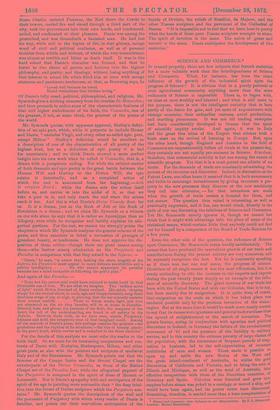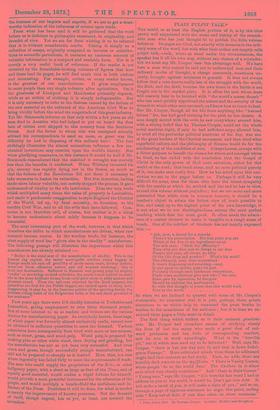SCIENCE AND COMMERCE."' IF treated properly, there are few subjects
that furnish materials for a more valuable work than the interdependence of Science and Commerce. What, for instance, has been the exact influence of the growth of the industrial spirit upon the progress of Science ? It is obvious that in a purely pastoral or even agricultural community anything more than the mere rudiments of Science is impossible. There is, to began with, no class at once wealthy and leisured ; and what is still more to the purpose, there is not the intelligent curiosity that is born partly of the desire for gain, and yet more of acquaintance with strange countries, their unfamiliar customs, novel productions, and startling phenomena. It was not till trading enterprise had been considerably developed in Greece that the spirit of scientific inquiry awoke. And again, it was in Italy and the great free cities of the Empire that science took a fresh start on the revival of learning in Europe. But, upon the other hand, though England and America in the field of Commerce are unquestionably before all rivals at the present day, they certainly are not equally pre-eminent in Science. Ibis clear, therefore, that commercial activity is but one among the ceases of scientific progress. Yet that it is a most potent one admits of no doubt. For the demands of trade are constantly stimulating the powers of the inventor and discoverer. Indeed, in discussion on the Patent Laws, one often hears it asserted that it is both unnecessary and futile to encourage inventiveness by giving inventors a pro- perty in the new processes they discover or the new machinery they call into existence, — for that inventions are made when the growth of trade creates a demand for them, and not sooner. The question thus raised is interesting as well as practically important, and it lies, one would think, directly in the path of any one discussing the relations of Science and Commerce. Yet Mr. Simmonds utterly ignores it, though we cannot but think that it might with advantage take the place of some of the statistical essays, which contain little that anybody could not find out for himself by a comparison of the Board of Trade Returns for a few years.
Even the other side of the question, the influence of Science upon Commerce, Mr. Simmonds treats hardly satisfactorily. The causes that have produced the marvellous growth of our trade and manufactures during the present century are very numerous, and he expressly recognises the fact. Yet he is constantly speaking as if there was but one real cause, the progress of science. Doubtless of all single causes it was the most efficacious, but it is surely misleading to cite the increase in our imports and exports during the past twenty years simply as an example of the influ- ence of scientific discovery. The great increase of our trade has been with the United States and with our Colonies, that is to say, has been mainly due to emigration. It is quite true, of coarse, that emigration on the scale on which it has taken place was rendered possible only by the previous invention of the steam- engine. But at the same time it would be much more nearly correct to say that its causes were ignorance and general backwardness than the spread of enlightenment or the march of invention. The potato famine, acting in conjunction with agrarian and political discontent in Ireland, in Germany the failure of the revolutionary movement of '48 and the pressure of the liability to military service, and in this country the extreme poverty of large classes of the population, with the recurrence of frequent periods of etag- nation in business, led to the self-expatriation of immense multitudes of men and women. These made it possible to open up and settle the new States of the West and the great island-continent of Australia, to utilise the gold discoveries of California and Victoria, and to bring the corn of Illinois and Michigan, as well as the wool of Australia, into effective' competition with those of the Danubian countries, of Germany and Spain. Colonies were founded and grew into empires before steam was yoked to a carriage or moved a ship, and would have been again, had its power never been discovered. Something, therefore, is needed more than a bare recapitulation of • Science and Commerce: their Influence on our Manufactures. By P. L. Simmonds London: Robert Bardwicke.
the increase of our imports and exports, if we are to get a trust- worthy indication of the influences of science upon trade.
From what has been said it will be gathered that the work before us is deficient in philosophic treatment, in originality, and breadth of view. Yet we are far from wishing it to be inferred that it is without considerable merits. Taking' it simply as a collection of essays, originally composed as lectures or contribu- tions to scientific periodicals, it contains an immense amount of valuable information in a compact and readable form. Nor is it merely a very useful book of reference. If the reader is not deterred by the formidable-looking columns of figures that here and there load its pages, he will find much that is both curious And interesting. For example, cotton, as every reader knows, is the greatest of our manufactures. It gives employment to more people than any single industry after agriculture. On it the greatness of Liverpool and Manchester primarily depends, while as an article of clothing it is simply indispensable. But it is only necessary to refer to the distress caused by the failure of the raw material on the outbreak of the American Civil War to bring vividly before the mind the magnitude of this great industry. Yet Mr. Simmonds informs us that only within a few years an old man died in America who had helped to put on board the first bale of cotton ever shipped to this country from the Southern States. And the factor to whom this was consigned actually advised his correspondents to send no more, so great was the difficulty he had in disposing of this solitary bale ! The fact strikingly illustrates the almost miraculous influence a few me- chanical inventions may exercise upon the world's history. But when glorifying commerce, in this instance it would be well if Mr. Simmonds remembered that the mischief it wrought was scarcely less than the benefits it conferred. When Whitney invented his gin, slavery was rapidly dying out in the States, so much so that the fathers of the Revolution did not deem it necessary to take measures to hasten its extinction. But this invention, having made slave labour valuable, not merely stopped the process, it gave undreamed-of vitality to the vile institution. Thus the very trade which multiplied many times the value of property in Lancashire, and made it pardonable exaggeration to style England the Clothier of the World, led up, by fatal necessity, to Secession, to the terrible Civil War, and to all the evils that have followed. Com- merce is not therefore evil, of course, but neither is it a thing to become enthusiastic about solely because it happens to be successful.
The most interesting part of the work, however, is that which describes the shifts to which manufacturers are driven, when raw material become scarce. In the woollen trade, for instance, the short supply of wool has "given rise to the shoddy" manufacture. The following passage will illustrate the importance which this manufacture has already attained :-
"Batley is the chief seat of the manufacture of shoddy. This is the famous rag capital, the tatter metropolis whither every beggar in Europe sends his cast-off gentility of moth-eaten coats, frowzy jackets, worn-out linen, offensive cotton, and old worsted stockings ; this is their last destination. Reduced to filament and greasy pulp by mighty 'swifts' or revolving toothed cylinders, the much-vexed fabrics re-enter life in the moat brilliant forme, froth solid pilot cloth to silky mohair and glossiest tweed. Thus the tall-coat rejected by the Irish peasant, the gabardine too foul for the Polish beggar, are turned again to shiny uses, reappearing, it may be, in the lustrous paletot of the sporting dandy, the delicate riding-habit of the Belgravian belle, or the sad, sleek garment of her confessor."
Four years ago there were 104 shoddy factories in Yorkshire and Lancashire, giving employment to over three thousand people. But of more interest to us as readers and writers are the various devices for manufacturing paper. As everybody knows, linen rags, of which paper was formerly almost exclusively made, cannot now be obtained'in sufficient quantities to meet the demand. Various substitutes have consequently been tried with more or leas success, such as straw, grass, and wood-pulp. Wood pulp is prepared by soaking pine or other white wood, then drying and grinding, but the manufacture has not as yet been very successful. And even straw and grass, though successfully enough manufactured, can still not be prepared as cheaply as is desired. Here, then, is a case where ingenuity has failed fully to meet the requirements of trade. The man who could supply the proprietors of the Echo, or other halfpenny paper, with a sheet as large as that of the Times, and of equally good material, would - realise a rapid fortune for himself, would provide a most powerful instrument for the education of the People, and would multiply a hundredfold the usefulness and in- fluence of the Press. Doubtless it will be done, for what is needed is merely the improvement of known processes. But the demand
of itself, though urgent, has as yet, at least, not secured the invention.



































 Previous page
Previous page